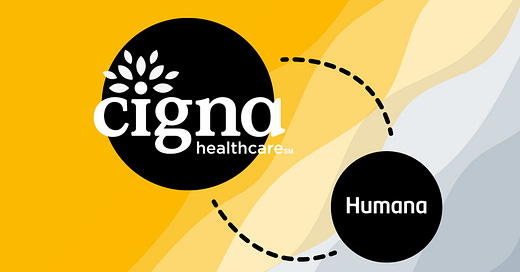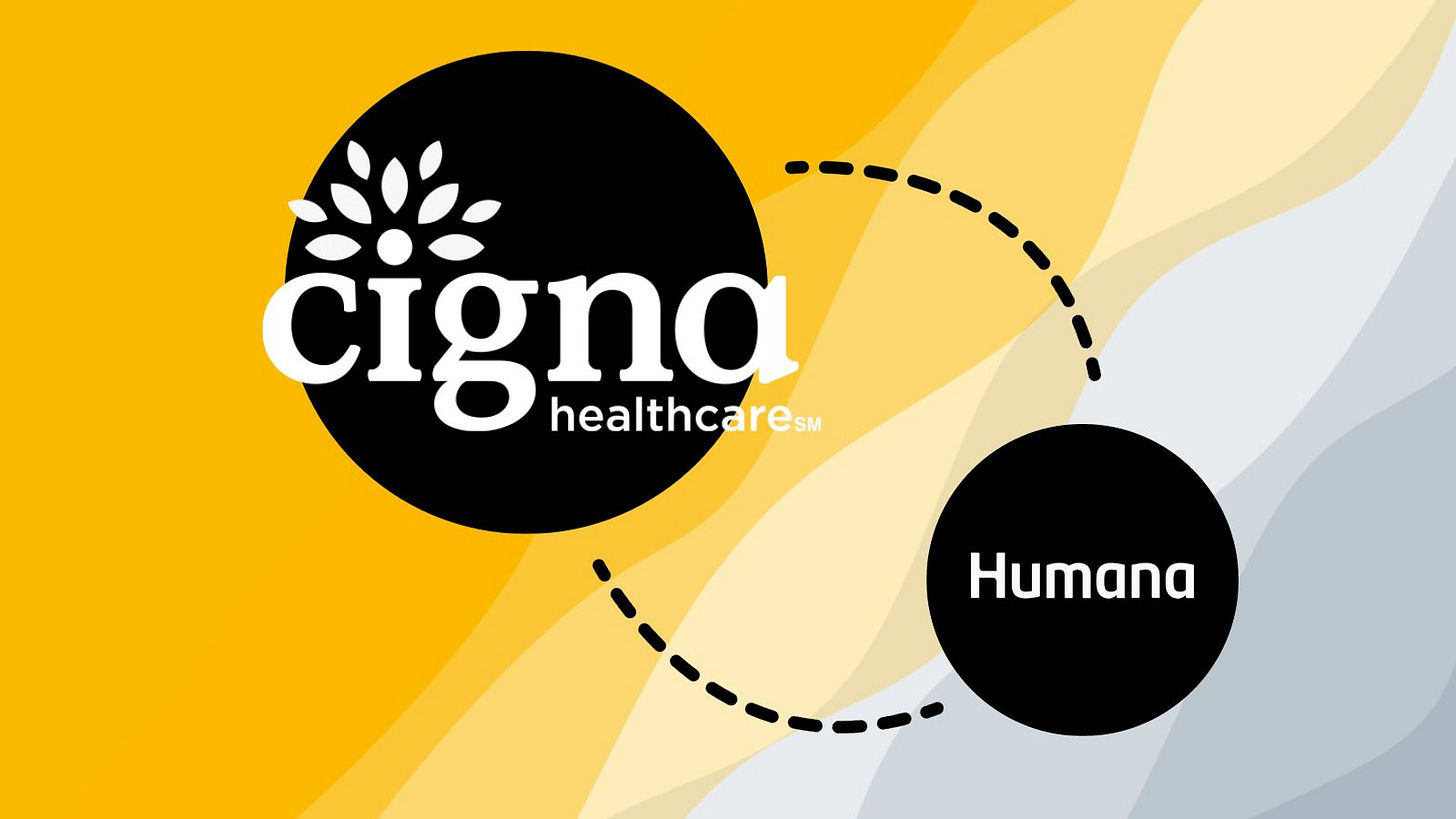Cigna and Humana, the two big insurers where I worked for nearly two decades, reportedly are in secret talks to join forces. The union–which would create a company much closer in size to UnitedHealthcare and CVS/Aetna, the fifth and sixth largest companies by revenue in America–likely would take shape as an acquisition of Humana by Cigna.
Both companies have been taking steps–or are rumored to be taking steps–that would enable them to put a deal together that would get a green light from regulators.
Louisville, KY.-based Humana, which has been in the private Medicare business for more than 40 years and has the second-largest enrollment in Medicare Advantage plans behind UnitedHealthcare, announced earlier this year that it is getting out of the commercial health insurance businesses. Bloomfield, CT-based Cigna, meanwhile, is looking to sell its Medicare Advantage business, according to Reuters.
Most of Cigna’s health plan enrollment by far over the years has been in the employer-sponsored health insurance market. Despite acquisitions of smaller companies that specialized in Medicare Advantage–and even some of Humana’s MA business in 2013–Cigna has never been able to become more than a bit player in the Medicare space.
With Humana jettisoning its commercial business and Cigna getting rid of its existing Medicare business, the companies would make the case to federal and state regulators that the combined company would not decrease competition in either the MA or commercial insurance businesses.
Cigna is far bigger today than it was when I worked there, thanks largely to its 2018 acquisition of pharmacy benefit manager Express Scripts. That acquisition made the company more of a PBM that also operates health insurance plans. The company gets far more revenue these days from Evernorth, the division that encompasses Express Scripts, than from its health plan division.
Cigna’s market capitalization is currently close to $85 billion. Last year the company reported operating earnings of $7.28 billion on revenues totaling $181 billion. Humana’s market cap is a little north of $63 billion. Its 2022 profits were $4.2 billion on $93 billion in revenues. By contrast, industry leader UnitedHealthcare has a market cap of half a trillion dollars. UnitedHealthcare reported total 2022 revenues of $324 billion and operating profits of $28.4 billion.
Cigna’s U.S. health plan enrollment was just shy of 18 million as of Sept. 30 of this year; of that total,16 million were commercial enrollees. Fewer than 2 million were in Medicare Advantage and other public programs.
Humana reported approximately 5.9 million Medicare Advantage enrollees on Sept. 30–three times more than Cigna, but enrollment in its employer-sponsored/commercial plans was only 694,000. The company also reported 1.3 million enrollees in the Medicaid programs it manages for seven states, 300,000 in its Medicare supplement (Medigap) business, and nearly 6 million in the TRICARE health plans it operates for the U.S. military. If the two companies do indeed become one, its total health plan enrollment in the U.S. would be approximately 30 million.
UnitedHealth would still be far bigger in terms of enrollment if such a union took place. It reported 47.3 million total U.S. health plan enrollees as of September 30 (27.3 in its commercial plans, 7.6 million in Medicare Advantage, 8.1 million in Medicaid, and 4.3 million in Medigap plans).
This is not the first time Cigna and Humana have considered merging. In 2017, Wall Street financial analysts were expecting the two companies to announce a deal after regulators blocked Anthem’s (now Elevance’s) proposed $54 billion acquisition of Cigna and Aetna’s proposed $37 billion acquisition of Humana. Aetna would soon become part of CVS and Cigna would tie the knot with Express Scripts.
Now that Medicare Advantage has become the health insurance industry’s biggest cash cow, thanks to the federal government’s overly generous payments to private insurers, it makes sense that Cigna would be courting Humana. One source told me that at Cigna, it’s “all hands on deck” to put the deal together.
As someone who managed communications around mergers and acquisitions when I was at Cigna, I can assure you that’s an overstatement–only a handful of corporate executives on both sides would be involved in any negotiations, and everyone in the know would have had to sign agreements not to even acknowledge talks were happening–but it does indicate that Cigna sees such a deal as a strategic priority.
The two other smaller for-profit companies with significant Medicare Advantage and Medicaid enrollment–Centene and Molina–could also be potential acquisition targets for Cigna, but Humana would be the better prize.
Another reason to believe there is something to the speculation is the fact that Humana last month announced it had hired former UnitedHealth executive Jim Rechtin as chief operating officer and CEO-in-waiting. The company said Rechtin will succeed current CEO Bruce Broussard when Broussard retires next year. In its press release, Humana noted that Rechtin also spent 14 years at Bain & Company, “highlighting his depth of experience in health care mergers and the overall health care sector.”





Wendell, thank you for your continued professional analysis of these transitions. It makes me dizzy watching these mergers and knowing in the end, it isn’t about the common good or the consumer.
And, the marketing of Medicare Advantage is relentless. Be well!
What comes after trillion? How many unnecessary deaths does the Medicare Advantage plans cause?